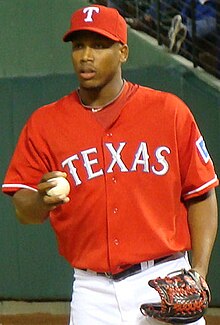Pedro Strop

Position: Relief Pitcher (rhp)
Born: June 13, 1985
Height: 6'0"
Weight: 175
B/T: R/R
Grading Out:
Current (Future)
Mechanics: 35/40 (45)
Fastball: 50/55 (60)
Splitter: 50 (55/60)
Slider: 40 (45)
Control: 35 (40)
Command: 30 (35/40)
Feel: 35 (40)
Overall: 45 (50)
OFP Range: 47-53 (potential 7th or 8th inning arm)
Physical Description:
Strop has a strong, athletic build, with a sturdy trunk from years as an infielder. He shows clean actions off the mound and moves around well on it.
Mechanics:
Strop began his pro career as a shortstop, converting to the mound in 2006 while in the Rockies organization. It is not surprising that the hard-throwing righty lacks a "classic" set of mechanics. It is interesting, however, that the former infielder utilizes such a long and whippy arm action out of a high three-quarters slot -- the opposite of what you would see coming from the six-spot. Strop's primary mechanical issues come from this arm action/slot combination, and are exacerbated by a high effort lower-half and periodic stiff landing. All of this leads to great inconsistency in his release, affecting the consistency of his slider and his control over the whole arsenal. When he lands stiff on his front leg (usually failing to get over top) he cuts off his motion and causes his arm to come across his body, which in turn causes him to push the ball up in the zone and also leads to first base fall-off. He can also overthrow -- especially when ahead in the count -- though this is tied more to his mental approach, as it isn't a mainstay in his motion. Finally, he flashes high and early, giving the batter a clear look at the ball for an extended period of time.
Throws:
Fastball - Strop uses both a four-seam and a two-seam fastball, capable of dialing-up to 97/98 mph with the four-seamer. He will get solid armside life on the two-seamer around 92-93 mph, and creates good downhill plane with both variations. He struggles to command his fastball, but when in the zone it is a legit plus pitch that will miss bats.
Splitter - Strop's splitter is a mid- to upper-80s vanisher when he hits his release. It's a bury pitch that loses effectiveness when he tries to drop it into the zone, so it is almost exclusively a chase weapon to be utilized ahead in the count. The velocity and break qualify it as a potential plus pitch, but the limited utility drops a half step for me.
Slider - The breaker is the biggest victim of Strop's failure to consistently hit his release point. When he does, he snaps off a nice solid average low- to mid-80s slider with excellent tilt and good deception. Unfortunately, his inability to repeatedly execute the pitch leaves too many spinners out over the plate, making it a questionable ML offering at this point.
Summary:
Strop has a special arm, and should be commended for reinventing himself as a power arm in the pen after struggling with the stick earlier in his professional career. Ideally, he can rein in his mechanics enough over short spurts to provide valuable innings in the 7th and 8th. The heavy downhill plane on his pitches, high slot and diving fastball and splitter will produce plenty of grounders if Strop can find a way to catch the strike zone more consistently. It is unlikely he will produce many sub-10 pitch innings, and baserunners are going to be mainstays. But the raw stuff is good enough to miss bats and help Strop carveout a solid career in a Major League pen. He just needs to push the control dial a little further from "where is it going" and a little closer to the strikezone with more frequency. With in-and-out mechanics, he'll also need to maintain a steady head on the mound and create a mental rhythm to assist him in hitting his mechanical checkpoints. It will be on the Orioles developmental staff to help him to create that internal routine.
No comments:
Post a Comment